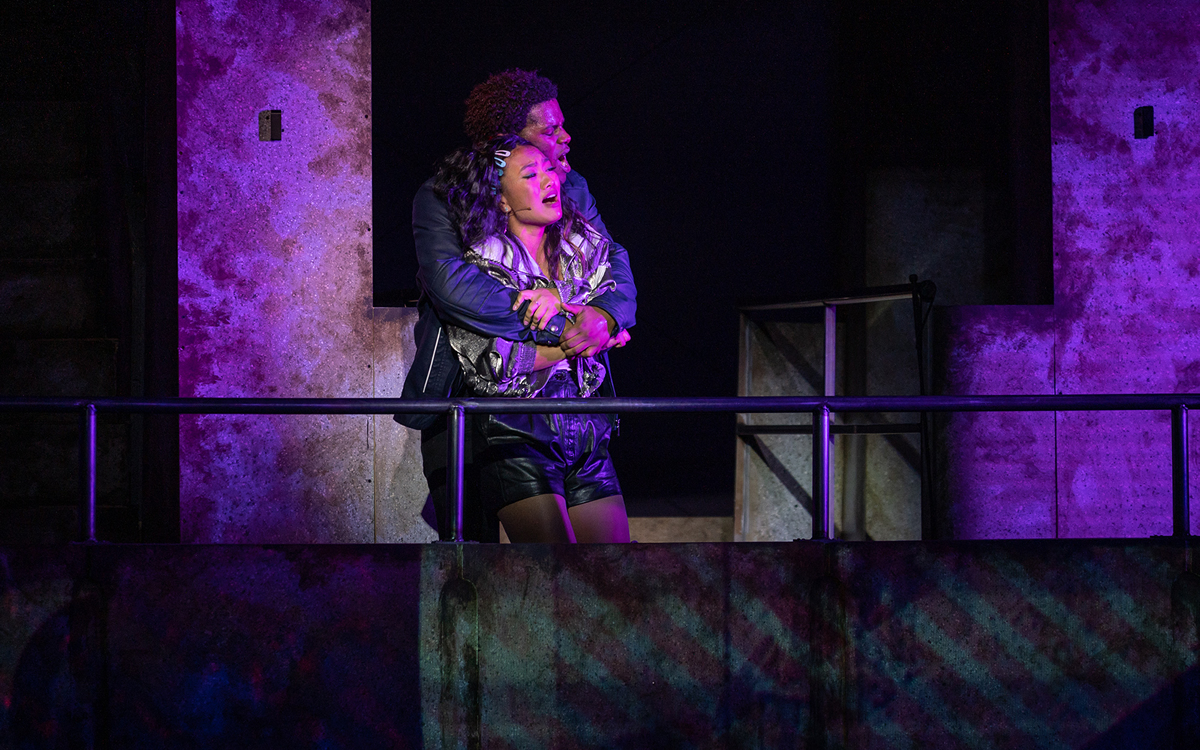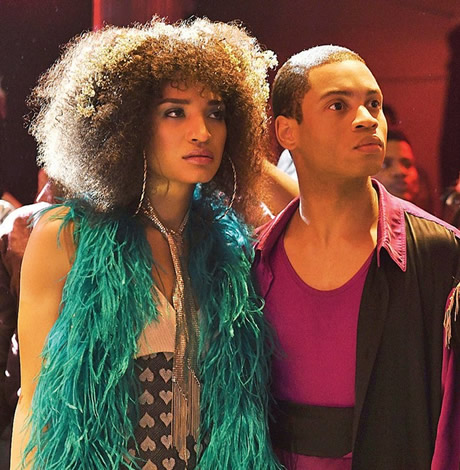Arts & Entertainment
Queer creator blends Shakespeare with iconic music of Pat Benatar
Could LA’s production of ‘Invincible’ make it to Broadway?

For millions of GenX-ers, the music of Pat Benatar and Neil Giraldo – Benatar’s longtime lead guitarist, collaborator, and producing partner, and her husband since 1982 – has been an iconic generational touchstone for more than four decades. This might be especially true for queer GenXers, who found inspiration during their formative years in the defiant spirit that resonated through many of the duo’s songs.
One of those queer GenXers was Bradley Bredeweg, the out co-creator of another queer touchstone, television’s “The Fosters,” which became a hit for five seasons on FreeForm with its story of a lesbian couple raising five adopted children. Now, Bredeweg – a self-described “theater kid” – is helping to bring Benatar and Giraldo’s music to a new generation of rebellious youth with “Invincible,” a new musical that intricately weaves the couple’s legendary catalogue with inspired new songs to re-imagine Shakespeare’s “Romeo and Juliet” for the 21st century.
“When I got into writing for television, I realized that I missed the equal exchange that happens between the people on the stage and the audience,” explains Bredeweg, who spoke with the Blade ahead of his show’s Nov. 22 opening at Beverly Hills’ Wallis Center for the Performing Arts. “I love film and television, obviously, I’m so grateful for it, but after a couple of years of doing it, I was like, ‘I miss that inner theater child, so I’m gonna moonlight.’”
The result of his “moonlighting” turns Shakespeare’s classic Verona setting into a modern, war-torn metropolis, and places his timeless tale of star-crossed lovers in a time of great transformation. Love and equality are forced to battle for survival as a newly elected chancellor works to return the city to its traditional roots and destroy a progressive resistance that is trying to imagine peace in a divided world – and if you think that sounds familiar, it’s by design. Its current run at the Wallis is its world premiere, but if things go as hoped, this is just the first step toward Broadway.
According to Bredeweg, however, it’s far from the beginning of his show’s journey.
“About 12 years ago, I realized I hadn’t read ‘Romeo and Juliet’ since high school and decided to read it again,” he tells us. “The next day I had to take a road trip – this was back in the era when I still had a CD book in my car – and I came across the “Best of” album of Pat Benatar and Neil Giraldo, so I popped it in and started driving. And because the story was obviously fresh in my head, I was listening to all these songs and realizing that if you line them up a certain way they totally tell the tale of ‘Romeo and Juliet.’ I wrote a first draft a couple of weeks later and then I just put it away and forgot about it.”
Much later, in 2015, he walked into a Los Feliz bar called the Rockwell (“It was this really cool kind of spot that we don’t have a lot of in LA, because we’re not a theatrical town”), where cabaret performances were sometimes mounted by visiting Broadway talent and Jeff Goldblum would do a gig every Wednesday night. Inspired by the vibe, he suddenly remembered, “this thing I had come up with all those years ago” and impulsively pitched the idea of putting it on to the bar’s manager. I said, ‘I’ve got this crazy idea where I want to combine Shakespeare with Pat Benatar,’ and she said, ‘That’s insane, but I’m a huge fan of your show and I love it, so let’s do it.’”
This early incarnation (then called “Love is a Battlefield”) was an unprecedented hit, enjoying a six-month run to sold out houses – that is, until Benatar and Giraldo’s manager attended a performance and recorded a video of the whole thing on his iPhone. He showed it to Benatar and Giraldo, and they were intrigued; but at the time, unbeknownst to Bredeweg, they were working on developing their own life story as a musical using their songs, so they sent a “cease and desist” letter to the Rockwell and the show was forced to shut down.
“It was heartbreaking, for all of us,” says Bredeweg, “because we knew we had something with real potential.”
Then, a year later, he got a call from a producer who told him Benatar and Giraldo wanted him to come to New York and discuss his musical.
“Of course, I said yes and got myself there immediately. We took a meeting on their tour bus, and we started talking about the musical they were developing, and suddenly we all started to move in the direction of doing ‘Love is a Battlefield.’ By the end of it we were all laughing about how we had started out with a ‘cease and desist’ order and here we were talking about coming together to do a show.”
In part, says Bredeweg, the couple was convinced to change course by their discussion of the proliferation of so-called “jukebox musicals” that have increasingly populated Broadway in recent years.
“We talked about how they have a shelf life, especially if they’re focused on a specific artist. They have a built-in audience, but beyond that, how can they stand the test of time? The real test of a timeless musical is if, in 40 years, every high school is doing it. I think that’s why we went back to using their iconic music to reinvent this epic, timeless tale.”
Another part of the appeal was how aptly the couple’s songs fit into Shakespeare’s classic – a coincidence, perhaps, but one that might be better described as synchronicity.
“When Pat and Neil met back in the late ‘70s it was supposed to just be a working relationship, but they fell head over heels in love with each other,” Bredeweg says. “When I got close to them, they told me they had been called the ‘Romeo and Juliet of the music world’ because the labels and managers and PR people were trying to break them up. They wanted Pat to stand on their own and Neil to just be her producing partner, and so much of what the two of them were creating at that time was about that struggle, about fighting that music industry system and saying, ‘let us figure this out for ourselves.’ That’s why so much of their music works inside of this story.”
For Bredeweg, the chance to realize his vision struck an intensely personal chord, too.
“I was always obsessed with the classics, but as a gay kid growing up in the ‘80s, I knew I felt different from everyone else, and as much as I loved them, I couldn’t really ‘attach’ to any character inside them. Nothing felt familiar to me, everything was from the point of view of a white cisgender person – and I always had these dreams, if I ever had any say, that I would love to tackle these classics in a different way and reposition them for a more diverse audience.”
In keeping with this mission, “Invincible” doesn’t just make Verona into a more modern city, but a more diverse one as well. The Capulet and Montague houses are run by the women, whose husbands are both dead; Romeo’s chum Benvolio is nonbinary, and falls in love with Juliet’s nurse; Juliet’s cousin Tybalt is secretly in love with her would-be husband, Paris; Paris himself is the city’s new chancellor, seeking the marriage as a means to control the vast Capulet fortune and deploy it to shore up his political power. In Bredeweg’s updated take on the tale, it’s a story about powerful men with powerful motives, with a matriarchy fighting against the traditional patriarchy and a younger generation trying to take control of its own destiny – and to ensure that it includes the freedom to love who they want.
“That’s obviously something the queer community can really understand,” says Bredweg. “We’ve been there and done that, the fight for marriage equality is all about that. It’s very much at the center of the show, and it was a big reason why I wanted to tackle the story, why I’ve rewritten so many characters with queer identities – taking these figures we thought we knew and giving them a more modern point of view.”
“Our culture is shifting in such huge ways,” he continues. “It goes back to my experience of not being able to find myself in these old tales. We are looking at our past, and pieces of art or the written world, or things in our politics, and we’re trying to reinvent these pinnacle moments in a way to make sure that history doesn’t always repeat, to move forward in different directions that are better for all of us. Especially the younger generations – they’ve stepped into this world where they’ve had no say in how chaotic things feel, and they are trying to take control of their identities and their path forward. That’s really what’s at the heart of our show.”
“Invincible” is not, of course, the first time “Romeo and Juliet” has been deconstructed and rebuilt as a musical; apart from the obvious example of “West Side Story,” the recent London import “& Juliet,” now a hot ticket on Broadway, presents an alternative version of the story in which the title character doesn’t kill herself, set to the music of pop songwriter Max Martin – responsible for hits from Britney Spears, the Backstreet Boys, NSYNC, and Céline Dion, among others.
Bredeweg isn’t worried about the competition.
“I never think about that kind of thing,” he tells us. “There’s always room for interpretation with classics of this stature. There’s space for both.”
His production, of course, has the added advantage of showcasing the music of two deeply beloved icons whose recent induction into the Rock and Roll Hall of Fame has catapulted their names back into the public arena in a big way – not that they were ever very far out of it.
For Bredeweg, though, the Benatar/Giraldo connection has always been much more than just a way to make his show marketable. It’s the whole reason “Invincible” even exists.
“Pat captured my heart as a young gay kid for obvious reasons. There was something about her music, and her energy and messaging.
“It made me feel that if someone as powerful as her could exist, then I could, too.”
“Invincible” continues its run at the Wallis until Dec. 18. For tickets and more details, visit their website.
Television
ICYMI: ‘Overcompensating’ a surprisingly sweet queer treat
A sweet, savvy show about breaking free to embrace your true self

Pride month 2025 is now behind us, and while it’s safe to say that this year’s celebrations had a darker edge than usual, it’s also true that they came with a particularly rich bounty of new queer movies and shows to entertain us – so many, in fact, that even if we are facing a lull until the fall another harvest of fresh content, there are still plenty of titles – which, for whatever reason, were off your radar – for you to catch up on in the meantime.
One of the most notable of these – the bingeworthy series “Overcompensating” (now streaming on Amazon Prime) – will most definitely have been ON the radar for the plentiful fans of creator and star Benito Skinner, the actor/comedian who rose to viral fame through his content on platforms like Instagram, YouTube, and TikTok. For anyone else, it might have easily slipped through the cracks.
Created and written by Skinner as a loosely autobiographical “college comedy,” it aims for the kind of raucous, explicitly sexed-up tone one expects from the genre as it centers on Benny (Skinner), newly arrived as a freshman at prestigious Yates University. A former football jock and “golden boy” at his midwestern high school, he’s the picture of idealized youthful masculinity; he’s also deep in the closet, struggling to keep his sexuality hidden and maintain his macho front under the intense scrutiny of the college’s social scene – and under the resentful eye of his older sister Grace (Mary Beth Barone), who has already secured her own place at the top of the pecking order.
In the first episode, Benny’s difficulties are eased when he meets Carmen (Wally Baram), another freshman trying to navigate the politics of college life; a gamer from a home marred by tragedy, she’s an outsider who feels like she’s putting on an act, too, and they click – giving him the convenient “cover” of female companionship while providing them both with much-needed support and encouragement. He’s also befriended by a handsome film major from England (Rish Shah), who has already caught his eye, stirring other kinds of feelings and possibly even reciprocating them. Meanwhile, he’s being courted by the school’s “exclusive secret society” – headed by his sister’s aggressively “alpha” boyfriend Pete (Adam DiMarco) – and trying to stay interested in his studies, despite a growing realization that a career in business doesn’t actually appeal to him all that much.
That’s a lot to juggle for anybody, even an overachiever like Benny – whose “lucky” life so far has largely been the result of playing a role he is finding harder and harder to maintain. As the series goes on through its eight-episode arc, it becomes clear that he’s not the only one who is “keeping up appearances,” and he, along with the other confused and damaged young people in his orbit, begins the painful (but often hilarious) process of evolution that is required in order to become truly oneself.
Directed toward appealing to a younger demographic, “Overcompensating” is the kind of show that requires a few episodes worth of invested time to make an impression that feels like substance. Full of the bawdy farcical antics that go hand in hand with stories about hormonally charged college kids, it’s not above leaning into the formulas and tropes that have always driven these kinds of comedies. At first, while its broadly comedic strokes and frequently explicit sexual hijinks might elicit plenty of chuckles, the show might easily feel tiresome for more mature audiences; there’s a nostalgic fun to it, made even more appealing, somehow, by the “political incorrectness” of its frequently sexist and homophobic humor, but for a while things may feel like an unnecessary attempt to reinvent “Animal House” for the Gen Z crowd.
By the time the season reaches its halfway point, however, things have started to get real. The antics of these horny almost-adults take on a more pointed absurdity, informed by the increasingly tangled web of defensive deceit they weave among themselves – and, as things draw toward a cliffhanger climax, the consequences of maintaining it – until it achieves a sense of empathy toward them all. There’s a wisdom that smacks of lived authenticity underlying the whole affair, transforming it from the “sexploitative” teen comedy of its surface into something deeper. To be sure, things stay expectedly wacky, and the soap-operatic melodrama of its twists and reversals continue to maintain the show’s “mature YA” appeal; but beneath those trappings, by the end of the season a truer identity has begun to emerge, just as its characters have begun to find their own levels of self-actualization for themselves.
As creator, primary writer, and star, it’s obviously Skinner who deserves much of the credit. While it might be tempting, early on, to dismiss the show as an “ego project,” the internet-spawned sensation proves his talents quickly enough to get past such judgy suspicions, delivering a pitch-perfect blend of sauciness and sensitivity that extends its appeal toward both ends of the taste spectrum; just as crucially, he brings the same aforementioned “lived authenticity” to his winning performance – after all, he’s essentially playing himself in a fictionalized version of his own life – while also making sure that equal time (and compassion) is afforded all the other characters around him, each of whom are pushing at the boundaries of their own respective “closets,” too. It’s unavoidable to notice that – like most of his co-stars – he’s plainly a decade too old to be playing a college student; but by the time we reach that crucial halfway turning point, we’ve become too engaged by him to care.
The show is full of excellent performances, in fact. Relative newcomers Baram and Barone offer layers of complex nuance, while the more familiar DiMarco (“White Lotus”) is close to heartbreaking as the toxic BMOC clinging to the illusion of power as his life begins unraveling around him. Other standouts include the mononymic actress Holmes as Carmen’s “wild child” roommate, solidly likable turns as Benny’s parents from mature veterans Connie Britten and Kyle MacLachlan (whose presence, along with stylish elements in several key scenes, hints at an homage-ish nod to the late David Lynch), and podcaster Owen Thiele as an openly gay fellow student who has Benny “clocked” from the moment they meet. Finally, Lukas Gage makes a deep impression as a former high school teammate at the heart of Benny’s most haunting memory.
There’s no official word yet on whether “Overcompensating” will be renewed for a second season, despite the multiple loose ends left dangling at the end of its first; it has proven to be popular, and Skinner’s large fanbase makes it likely that the story will continue. Even if it doesn’t, the place of uncertainty in which it has left its characters rings true enough to serve as a satisfying endpoint.
As for us, we hope that won’t happen. For all its sophomoric humor, generic plot twists, and purposefully gratuitous sexual titillation, it’s one of the sweetest, kindest, and most savvy shows we’ve seen about breaking free from conformity to embrace your true self – and that’s a message that applies whether you’re queer, straight, or anywhere in between.
Photos
PHOTOS: Independence Day Weekend in Rehoboth
Wicked Green Pool Party, fireworks among festivities

Vacationers and residents alike enjoyed Independence Day Weekend activities in Rehoboth Beach, Del. The Wicked Green Pool Party drew hundreds to the CAMP Rehoboth fundraiser on Saturday. That evening, revelers went to the rooftops to watch the fireworks display.
(Washington Blade photos by Daniel Truitt)













Music & Concerts
Red, White, and Beyoncé: Queen Bey takes Cowboy Carter to D.C. for the Fourth of July
The legendary music icon performed on July 4 and 7 to a nearly sold-out Northwest Stadium.

Just in time for Independence Day, Beyoncé lit up Landover’s Commanders Field (formerly FedEx Field) with fireworks and fiery patriotism, bringing her deeply moving and genre-defying “Cowboy Carter” tour to the Washington, D.C. area.
The tour, which takes the global icon across nine cities in support of her chart-topping and Grammy-winning country album “Cowboy Carter,” landed in Prince George’s County, Maryland, over the Fourth of July weekend. From the moment Beyoncé stepped on stage, it was clear this was more than just a concert — it was a reclamation.
Drawing from classic Americana, sharp political commentary, and a reimagined vision of country music, the show served as a powerful reminder of how Black Americans — especially Black women — have long been overlooked in spaces they helped create. “Cowboy Carter” released in March 2024, is the second act in Beyoncé’s genre-traversing trilogy. With it, she became the first Black woman to win a Grammy for Best Country Album and also took home the coveted Album of the Year.
The record examines the Black American experience through the lens of country music, grappling with the tension between the mythology of the American Dream and the lived realities of those historically excluded from it. That theme comes alive in the show’s opening number, “American Requiem,” where Beyoncé sings:
“Said I wouldn’t saddle up, but
If that ain’t country, tell me, what is?
Plant my bare feet on solid ground for years
They don’t, don’t know how hard I had to fight for this
When I sing my song…”
Throughout the performance, Beyoncé incorporated arresting visuals: Black cowboys on horseback, vintage American iconography, and Fox News clips criticizing her genre shift — all woven together with voiceovers from country legends like Dolly Parton and Willie Nelson. The result was a multimedia masterclass in storytelling and subversion.
The “Cowboy Carter” tour has been a social media sensation for weeks, with fans scrambling for tickets, curating elaborate “cowboy couture” outfits, and tailgating under the summer sun. At Commanders Field, thousands waited in long lines for exclusive merch and even longer ones to enter the stadium — a pilgrimage that, for many, felt more like attending church than a concert.
One group out in full force for the concert was Black queer men — some rocking “denim on denim on denim on denim,” while others opted for more polished Cowboy Couture looks. The celebration of Black identity within Americana was ever-present, making the concert feel like the world’s biggest gay country-western club.
A standout moment of the night was the appearance of Beyoncé’s 13-year-old daughter, Blue Ivy Carter. Commanding the stage with poise and power, she matched the intensity and choreography of her mother and the professional dancers — a remarkable feat for someone her age and a clear sign that the Carter legacy continues to shine.
It’s been nearly two decades since Beyoncé and Destiny’s Child parted ways, and since then, she’s more than lived up to her title as the voice of a generation. With “Cowboy Carter,” she’s not just making music — she’s rewriting history and reclaiming the space Black artists have always deserved in the country canon.
-

 Federal Government2 days ago
Federal Government2 days agoTreasury Department has a gay secretary but LGBTQ staff are under siege
-

 Virginia3 days ago
Virginia3 days agoDefying trends, new LGBTQ center opens in rural Winchester, Va.
-

 District of Columbia2 days ago
District of Columbia2 days agoGay GOP group hosts Ernst, 3 House members — all of whom oppose Equality Act
-

 Opinions4 days ago
Opinions4 days agoUSAID’s demise: America’s global betrayal of trust with LGBTQ people










